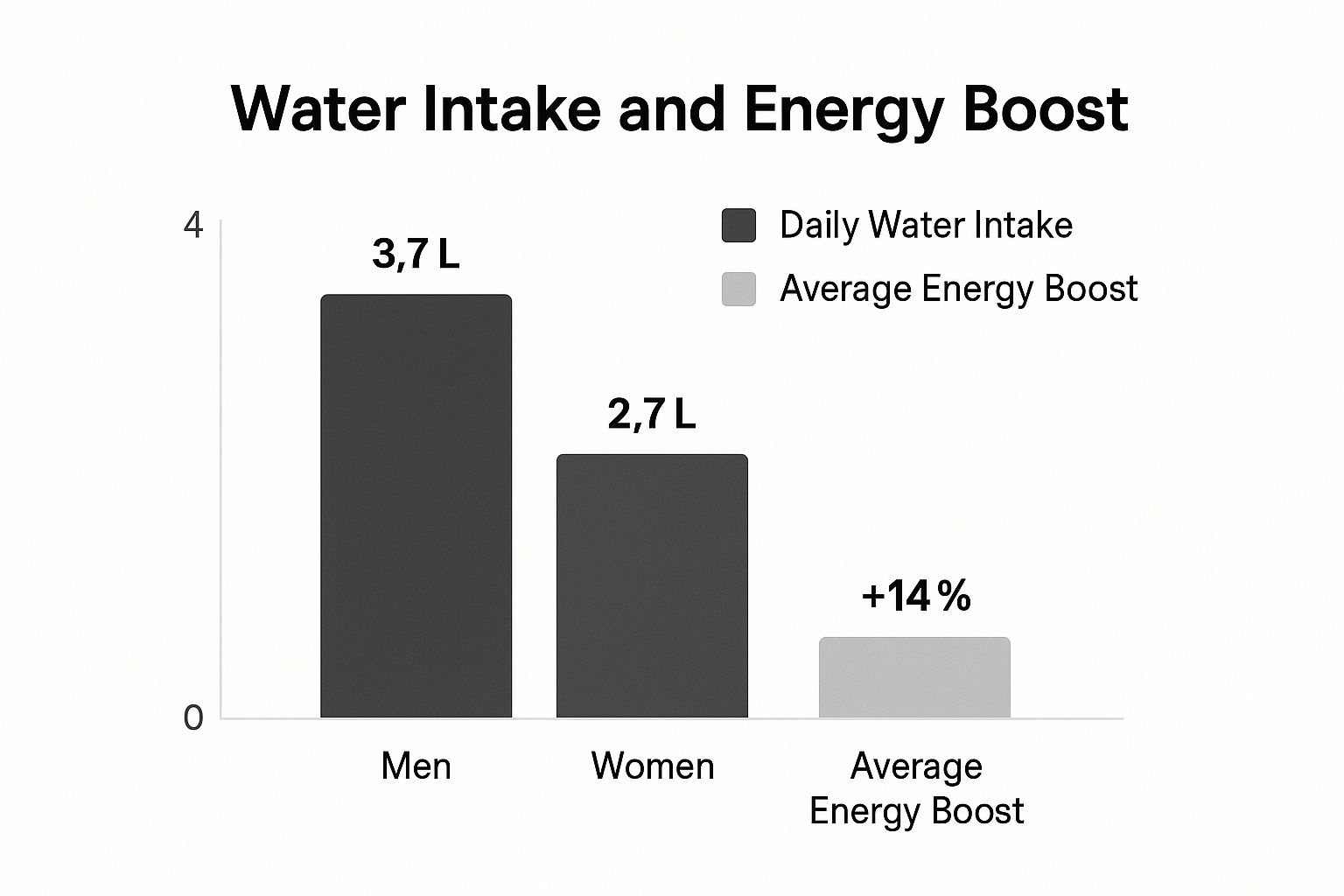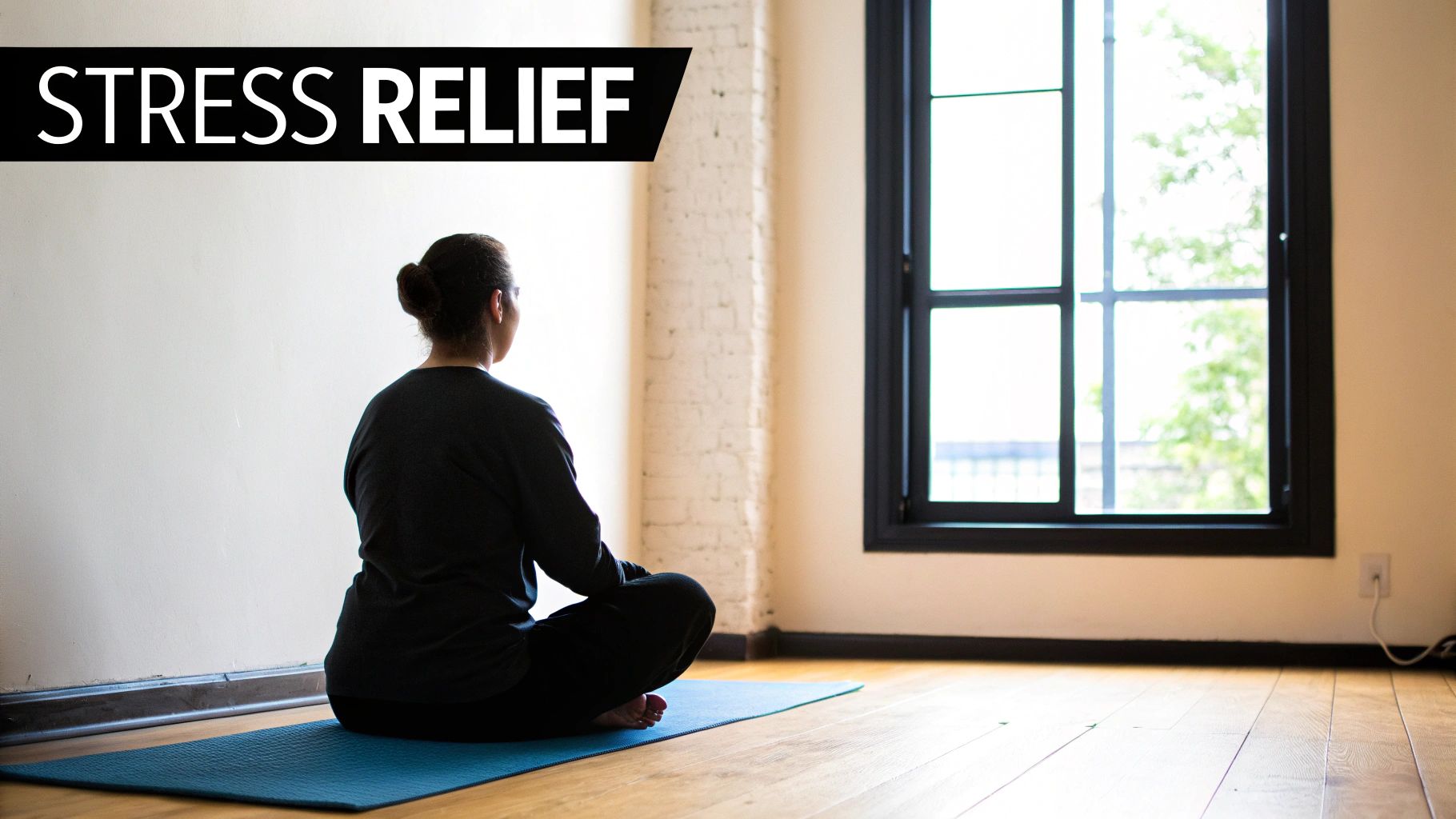Feeling constantly drained is more than just being tired—it’s a powerful signal from your body that something is out of sync. If you want to truly boost your energy naturally, the first step is to look beyond the surface and identify what’s really draining your tank. Often, the culprits are things we’ve come to accept as normal, like chronic stress, poor sleep, and a diet that isn’t truly nourishing us.

Why Your Energy Is So Low and How to Fix It
If you feel like you're perpetually running on fumes, you're in good company. That sensation of being completely spent has become an all-too-common part of modern life. It's tempting to just blame a packed schedule, but the real reasons for low energy usually run much deeper.
I like to think of energy as a bank account. You make deposits through rest, good food, and restorative activities. You make withdrawals with work, exercise, and stress. When your withdrawals constantly outpace your deposits, you end up with an energy deficit that leaves you feeling foggy, unmotivated, and just plain tired.
The Heavy Toll of Chronic Stress
One of the biggest thieves of our energy is chronic stress. When you're constantly under pressure, your body pumps out cortisol, our main stress hormone. In short, acute situations, this is a lifesaver. But when it’s elevated day in and day out, it throws nearly every system in your body out of whack, disrupting sleep, messing with digestion, and keeping your nervous system on high alert.
This constant "fight or flight" state is incredibly draining. Your body is revved up for a threat that isn't there, burning through precious energy reserves with no chance to recover. It's no wonder this cycle leaves you feeling not just physically exhausted, but mentally fried, too. For those stuck in this pattern, exploring options like acupuncture for stress management can offer a powerful way to help your system find its balance again.
When stress becomes a constant companion, your body is forced to "borrow" energy from essential functions like immune response and digestion just to keep up. This is a key reason why prolonged stress often leads to both exhaustion and other health issues.
Riding the Blood Sugar Rollercoaster
What you eat has a direct and almost immediate impact on how you feel. If you’re relying on sugary snacks, refined carbs, and processed foods, you’re essentially sending your blood sugar on a wild ride. You get that quick, satisfying burst of energy, but what inevitably follows is the crash.
That sharp drop in blood sugar leaves you feeling even more tired than before, and what do we usually reach for? Another quick fix. This creates a vicious cycle of energy spikes and dips, making it impossible to achieve stable, sustained vitality throughout the day.
Your body, much like a high-performance car, needs the right kind of fuel to run efficiently. It’s not just about calories; it’s about quality. Key factors include:
- Nutrient Gaps: Deficiencies in crucial nutrients like iron, B vitamins, and magnesium can directly hamstring your body's ability to produce energy at the cellular level.
- Dehydration: Sometimes, that afternoon slump is just your body crying out for water. Dehydration is a surprisingly common cause of fatigue.
- Poor Sleep Quality: It’s not just about the number of hours you’re in bed. True, restorative sleep is when your body does its most important work—repairing tissues, consolidating memories, and regulating the very hormones that govern your energy.
To truly fix your fatigue, you have to start by identifying these energy drains. By shifting your focus from quick fixes to the foundational pillars of health—managing stress, balancing your diet, and prioritizing genuine rest—you can finally start making consistent deposits into your energy account and build a reserve of lasting vitality.
Fueling Your Body for All-Day Vitality
Your diet is the bedrock of your energy levels. If you feel like your internal battery is constantly hovering around 20%, it’s time to take a hard look at the fuel you’re putting in your body. Let's move past the generic advice and get into a practical blueprint for how to boost energy naturally through what you eat, turning your meals into sources of sustained power.
Think of it this way: simple sugars and refined carbs are like kindling for a fire. They burn hot and fast for a moment, then they're gone, leaving you with nothing. This is the classic afternoon crash that sends so many of us scrambling for another coffee or sugary snack.
Choose Your Fuel Wisely
To build a fire that lasts, you need slow-burning logs. In dietary terms, these are complex carbohydrates. These foods are your best friends for steady energy because they break down slowly, releasing a reliable stream of glucose—your body's main fuel—into your bloodstream. This prevents the jarring spikes and subsequent crashes that leave you feeling foggy and fatigued.
Truly effective dietary strategies always circle back to whole foods that offer this sustained release. Research consistently shows that complex carbs, like those in sweet potatoes and whole grains, are brilliant for maintaining stable glucose levels. At the same time, quality proteins from sources like eggs and lentils are crucial for brain function and muscle repair, which directly impacts your mental alertness and physical stamina. If you want to dig deeper into how specific foods affect your energy, the insights on food choices for vitality from Medical News Today are a great resource.
To help you put this into practice immediately, it's useful to see a direct comparison of what to add to your plate and what to leave behind.
Energy-Boosting Foods vs. Energy-Draining Foods
The table below contrasts food choices that provide lasting energy with those that typically lead to a slump. Making conscious swaps can fundamentally shift your daily energy patterns.
| Nutrient Category | Sustained Energy Foods (Examples) | Energy-Draining Foods (Examples) |
|---|---|---|
| Complex Carbs | Quinoa, Brown Rice, Oats, Sweet Potatoes, Yams | White Bread, Pastries, Sugary Cereals, Soda |
| Quality Proteins | Eggs, Lentils, Chickpeas, Greek Yogurt, Fish | Fried Meats, Processed Sausages, Deli Meats |
| Healthy Fats | Avocado, Nuts, Seeds (Chia, Flax), Olive Oil | Margarine, Packaged Snacks, Fast Food Fries |
Building your meals around the foods in the "Sustained Energy" column is one of the most powerful changes you can make. It's a simple, direct path to better energy.
The Unsung Heroes of Hydration and Micronutrients
Beyond the big three macronutrients, two other elements are absolutely critical for energy: water and micronutrients. It's a simple but often overlooked fact that even mild dehydration can show up as fatigue. Before you assume you need more caffeine, ask yourself if you’ve had enough water today.

As you can see, proper hydration isn't just a suggestion; it's a powerful tool. Studies have shown that meeting your daily hydration needs can lead to an average energy increase of around 14%. That’s a significant boost from something as simple as drinking enough water.
Micronutrients, especially B vitamins and iron, are also essential. Think of them as the spark plugs in your body's engine—they are vital for converting the food you eat into usable cellular energy.
Building Your Energy-Boosting Plate
A simple model I use with clients is the "plate method." Aim to fill half your plate with non-starchy vegetables (like leafy greens, broccoli, or bell peppers), one-quarter with a quality protein source, and the final quarter with a complex carbohydrate. This framework naturally creates a balanced meal for sustained power.
For instance, a great lunch could be a large salad with grilled chicken and a side of quinoa. For breakfast, you might try scrambled eggs with spinach and a slice of whole-grain toast. This isn't about restrictive dieting; it’s about making smarter, more strategic food choices to fuel your life.
How Movement Creates More Energy

It sounds completely counterintuitive, doesn't it? When you're bone-tired, the absolute last thing you feel like doing is getting up and moving. But what if I told you that expending a little energy is precisely how you create a lot more of it? This isn’t just some motivational platitude; it's grounded in our biology.
When you exercise regularly, you’re sending a powerful signal to your body. Inside your cells are tiny power plants called mitochondria. Consistent physical activity tells your body to build more of these mitochondria to keep up with the demand. More power plants mean a bigger energy grid.
So, instead of draining your battery, you're actually upgrading its capacity. You become more efficient at generating and using energy, making that afternoon slump far less likely to hit.
From Sluggish to Stronger
I know how daunting it can feel to even think about exercise when you're already running on empty. The trick is to stop thinking about grueling, high-intensity workouts and instead focus on one thing: consistency. You don't need to sign up for a marathon to feel the benefits.
The real goal is to gently coax your body out of a sedentary state. In my experience, short and regular bursts of movement are far more effective for building sustainable energy than the occasional heroic workout that leaves you wiped out for days.
Here are a few practical ways to get started:
- Take a Brisk 20-Minute Walk: Never underestimate the power of a quick walk. Squeezing one in on your lunch break gets your blood flowing, delivering a fresh wave of oxygen to your brain and muscles. It’s an instant antidote to mental fog.
- Try a Gentle Yoga Flow: Yoga is a fantastic tool because it tackles fatigue from three angles: movement, breathwork, and mindfulness. It soothes your stress response while gently building strength and flexibility.
- Incorporate Light Strength Training: You don't need heavy weights. Simple bodyweight exercises like squats, lunges, and push-ups build lean muscle. The more muscle you have, the higher your resting metabolism, meaning you burn energy more efficiently all day long.
The most crucial piece of advice I can give is to find an activity you actually like. If you dread your workout, it’s just another drain on your mental energy. Whether it’s a dance class, a bike ride through a park, or even just some vigorous gardening, find your rhythm.
The Science Behind the Energy Boost
The positive effects of movement ripple out well beyond your cells. When you move, your heart and lungs get a workout, too. A stronger cardiovascular system means your body doesn't have to struggle to pump blood and oxygen, which conserves a surprising amount of energy.
And let's not forget the mental side of things. Exercise triggers a release of endorphins—those wonderful "feel-good" chemicals—that naturally lift your mood and make you feel more alert. This rush can be an incredible weapon against the mental exhaustion that almost always tags along with physical fatigue.
A review from Harvard Health confirms that consistent physical activity is a powerful way to boost energy. It works by improving cardiovascular fitness, building muscle, and promoting deeper sleep—all of which directly fight fatigue. This isn't just for healthy people; the effect holds true even for those with chronic conditions where fatigue is a primary symptom. You can read more about the science behind exercise and energy on health.harvard.edu.
By making consistent, moderate activity a part of your life, you're doing so much more than just burning calories. You're building a more resilient, efficient, and energized you.
Master Your Sleep for Peak Daytime Performance
https://www.youtube.com/embed/fk-_SwHhLLc
It's easy to think of sleep as just hitting the pause button on your day, but that couldn't be further from the truth. Sleep is an incredibly active process, your body's dedicated time for repair, restoration, and energy management. In my experience, neglecting sleep is the single fastest way to drain your energy reserves for the next day. While you're sleeping, your body is working overtime to mend tissues, solidify memories, and, most importantly, balance the very hormones that dictate your energy and mood.
We often get fixated on hitting that magic number of eight hours. But here's a crucial distinction: quality trumps quantity every time. Eight hours of tossing and turning will leave you feeling far worse than five hours of solid, uninterrupted rest. True restorative sleep means cycling smoothly through the different sleep stages, each with its own critical job.
For instance, deep sleep is when your physical body does most of its heavy lifting—releasing growth hormone and repairing muscles. REM sleep, on the other hand, is essential for processing emotions and locking in what you've learned. If you shortchange either stage, you'll wake up feeling physically achy and mentally scattered, making it nearly impossible to feel energized.
Create Your Sleep Sanctuary
Your bedroom environment sends powerful signals to your brain, either encouraging or preventing deep rest. To get the kind of sleep that truly boosts your energy, you have to treat your bedroom as a space exclusively for rest and recovery—a true sanctuary.
This comes down to controlling three key factors: light, temperature, and noise.
- Embrace Total Darkness: Even a sliver of light from a phone charger or a streetlight can suppress melatonin, the hormone that tells your brain it's time to power down. I always recommend blackout curtains and covering or unplugging any electronics that glow.
- Stay Cool: Your body temperature needs to drop slightly to initiate sleep. Most sleep experts agree that a room temperature between 60 and 67 degrees Fahrenheit (15-19°C) is the sweet spot. A warm, stuffy room is a recipe for a restless night.
- Block Out Distractions: Sudden noises are notorious for pulling you out of the deeper, more restorative stages of sleep. If you can't control outside noise, a white noise machine or a good pair of earplugs can create a consistent, peaceful backdrop.
Making these small adjustments can have a surprisingly dramatic impact on how quickly you fall asleep and how refreshed you feel when you wake up.
If you do just one thing, make it this: go to bed and wake up at roughly the same time every single day. Yes, even on weekends. This is the most powerful way to anchor your body's internal clock, or circadian rhythm, and build a foundation for stable, predictable energy.
Build a Powerful Wind-Down Routine
You can't expect your brain to switch from 100 mph to zero in an instant. A non-negotiable part of good sleep hygiene is creating a wind-down routine that acts as a buffer between your busy day and a peaceful night. This is how you signal to your body and mind that it's time to prepare for rest.
About an hour before you plan to sleep, declare a screen-free zone. The blue light from phones, tablets, and TVs is especially good at tricking your brain into thinking it's still daytime, which throws a wrench in melatonin production.
Instead, swap screen time for something that genuinely calms you down. Some ideas that work well for my clients include:
- Reading a physical book (something relaxing, not a page-turning thriller).
- Taking a warm bath or shower; the drop in body temperature when you get out is a natural sleep trigger.
- Gentle stretching or a short meditation session to release physical tension and quiet a racing mind.
- Sipping a calming herbal tea, like chamomile or lavender, to soothe the nervous system.
Finally, watch what you consume in the evening. Caffeine can linger in your system for up to six hours, and a large, heavy meal right before bed can cause digestive discomfort that keeps you awake. When you master your sleep, you aren't just resting—you're actively building the energy you need to thrive tomorrow.
A Smart Approach to Natural Supplements and Herbs

Once you’ve got your diet, sleep, and movement dialed in, you can start looking at supplements and herbs. Think of them as reinforcements, not the front-line troops. They can offer targeted support where you need it most, but using them wisely is the key to getting real, lasting benefits.
It’s no surprise that people are looking for natural energy solutions. The global energy supplement market has exploded to a value of around USD 42 billion. This isn't just a trend; it's a massive shift away from sugary, synthetic energy drinks toward smarter ingredients like B-vitamins, amino acids, and trusted herbal extracts. You can see the full market breakdown in this detailed report from Future Market Insights.
This boom in popularity makes it more crucial than ever to know what you’re putting in your body and why.
Fueling Your Cellular Engine with Core Nutrients
Your body has a complex energy production system, and certain nutrients are the essential cogs in that machine. If you're running low on them, it’s like trying to run an engine with old, fouled spark plugs—it’s just not going to run smoothly.
Here are a few of the most critical players for energy:
- B Vitamins: This whole family of vitamins, especially B12, is fundamental for converting food into cellular fuel. A deficiency is one of the most common—and direct—causes of fatigue.
- Magnesium: This essential mineral is a helper in over 300 different enzyme systems in the body, many of which are directly tied to producing and using energy.
- Coenzyme Q10 (CoQ10): This powerful antioxidant lives inside your mitochondria, which are the power plants of your cells. CoQ10 is vital for keeping them running at peak capacity.
The point of these nutrients isn't to give you a temporary jolt. They are the fundamental building blocks your body needs to create its own sustainable energy. You’re not just borrowing energy from tomorrow; you're equipping your body to make it today.
A scenario I see all the time in my practice is someone who eats clean but still feels completely wiped out. A simple blood test often points to a borderline deficiency in something like B12 or iron. A targeted supplement can be that last missing piece that finally restores their vitality.
The Balancing Power of Adaptogenic Herbs
Beyond basic nutrients, there’s a remarkable class of plants known as adaptogens. What makes them so special is their ability to help your body adapt to and resist stress—a huge energy drain for most of us.
Instead of creating artificial energy, adaptogens help regulate your body’s stress-response system. Two of the most researched and effective are Ashwagandha and Rhodiola.
- Ashwagandha: Famous for its ability to help modulate cortisol levels. By calming an overactive stress response, it eases the mental and physical exhaustion that comes from being stuck in "fight or flight" mode.
- Rhodiola Rosea: This herb is a go-to for fighting fatigue and sharpening mental performance. It works by bolstering your body’s resilience against both physical and emotional stressors.
Adaptogens don't just put a band-aid on fatigue; they help you address one of its most common root causes. Of course, for those whose energy is drained by chronic stress or discomfort, looking beyond supplements is also crucial. It's often worth exploring alternative medicine for pain to create a more complete wellness strategy.
How to Use Supplements Safely and Effectively
Jumping into the world of supplements requires a thoughtful, informed mindset. The market is flooded with products, and the quality varies wildly. To make sure you're making a smart and safe choice, I always advise my clients to follow these core principles.
-
Talk to a Professional First. Before you start taking anything new, have a conversation with your healthcare provider. This is non-negotiable, especially if you have a pre-existing health condition or are on medication. They can help you spot potential deficiencies and rule out any risky interactions.
-
Demand Quality and Purity. Look for reputable brands that invest in third-party testing. This independent verification ensures that what’s on the label is actually in the bottle—and that it’s free from contaminants.
-
Start Low, Go Slow. More is rarely better with supplements. Begin with the lowest recommended dose and see how your body feels. You can always increase it later if needed, but this approach minimizes the risk of side effects.
-
Listen to Your Body. This is your most important guide. A good supplement should help you feel better over time, not worse. If you notice any negative effects, stop taking it and check in with your provider.
By approaching herbs and supplements with a healthy dose of respect and knowledge, you can turn them into powerful allies on your journey to building real, lasting energy.
Answering Your Top Questions About Natural Energy
When you first start exploring how to boost your energy naturally, a lot of questions pop up. It’s one thing to read about diet, sleep, and movement, but it's another thing entirely to put it all into practice. I get it.
My goal here is to answer the most common questions I hear from my patients. We'll get into realistic timelines, how to stay on track when life gets crazy, and the pitfalls to avoid. Think of this as your personal guide to building real, lasting vitality.
How Quickly Will I Actually Feel a Difference?
This is, without a doubt, the question I'm asked most often. The answer is both realistic and exciting. While you won't suddenly feel like a new person overnight, positive shifts can happen much faster than you might expect. Simple changes, like drinking enough water, can give you a noticeable lift in just a few hours.
For the more profound changes, the timeline varies.
- Quick Wins (Days to 1 Week): You can absolutely feel some initial benefits within the first week. By just improving your hydration, ditching sugary drinks, and adding a brisk daily walk, you can often cut through brain fog and head off that afternoon slump.
- Noticeable Shifts (2 to 4 Weeks): This is where the real momentum builds. After a few weeks of consistently eating well, sleeping better, and moving your body regularly, most people tell me they feel a genuine, sustained increase in their energy baseline. It's no longer just a "good day"; it's becoming their new normal.
- Deep Transformation (1 to 3 Months): Fundamental changes, like building more mitochondrial density through exercise or fully correcting a nutrient deficiency, simply take time. Stick with it for a few months, and you'll likely realize that your newfound energy isn't new anymore—it's just how you feel.
The real secret is to focus on small, compounding wins. Stop looking for one dramatic, overnight change. Instead, start noticing the subtle improvements—waking up a little easier, not needing that 3 PM coffee, or having more patience. These are the signs that you’re on the right track.
What Are the Biggest Mistakes to Avoid?
Knowing the common roadblocks can save you a ton of frustration. When people try to boost their energy naturally, I see them stumble over the same few hurdles time and again.
One of the biggest culprits is the all-or-nothing mindset. Someone decides they're going to change everything over a single weekend. They completely overhaul their diet, launch into an intense workout program, and try to adopt a perfect sleep schedule all at once. This approach is totally overwhelming and almost always leads to burnout in a week or two.
Another classic mistake is ignoring the fundamentals. It’s easy to get drawn in by expensive supplements or exotic “superfoods” while completely overlooking the basics. You can take all the Rhodiola in the world, but it won’t make a dent if you’re only sleeping five hours a night and living on processed food. Always, always start with the foundational pillars: sleep, nutrition, movement, and stress.
Finally, a critical oversight is failing to address underlying stress and anxiety. Chronic stress is a massive energy vampire. If it goes unmanaged, it will sabotage every other positive change you make. If you suspect stress is a major factor in your fatigue, our guide on how to reduce anxiety naturally offers some practical strategies to help you get that under control.
How Can I Stay Consistent When Life Gets Busy?
Life is unpredictable. A major project at work, a sick kid, or an unexpected family issue can derail even the most solid plans. The key to long-term success isn't being perfect; it's having a game plan for when things inevitably go sideways.
Here are a few practical strategies that work in the real world:
- Lower the Bar, Don't Skip: On a truly crazy day, forget the 45-minute workout. Just aim for a 10-minute walk around the block. Don't try to cook a gourmet meal; just get a protein and a vegetable on your plate. A little bit of something is infinitely better than a lot of nothing.
- Anchor Your Habits: Link your new energy habit to something you already do on autopilot. For instance: "After I brush my teeth in the morning, I will do five minutes of stretching." This "habit stacking" technique makes the new behavior feel less like another item on your to-do list.
- Prepare for the Inevitable: The single best thing you can do for your diet is meal prepping. Even just chopping some vegetables or cooking a batch of quinoa on a Sunday makes healthy choices almost effortless during a hectic week.
- Embrace the "Good Enough" Rule: Your sleep won't always be perfect. You'll sometimes eat something you "shouldn't." That's not a failure; it's life. The goal is progress, not perfection. Acknowledge it, let it go, and get right back on track with your very next choice.
Ultimately, rebuilding your energy is a marathon, not a sprint. It’s all about making small, intelligent choices, day in and day out. By having these answers, you're now better equipped to set realistic goals, sidestep common obstacles, and build a system that supports your vitality for good.
At Eric Tsai Acupuncture and Herbs, we believe in a personalized approach to restoring your body's natural balance and energy. If you're struggling with fatigue and seeking a path to sustained vitality, our combination of acupuncture, herbal medicine, and integrative therapies can help you address the root causes of your exhaustion. Learn more about how we can support your wellness journey by visiting us at https://drerictsai.com.

